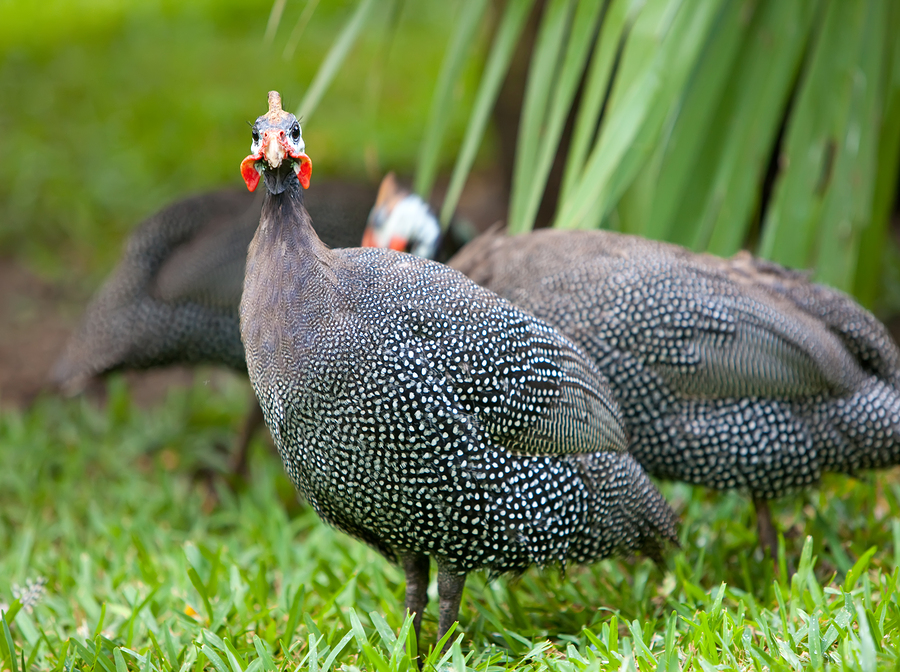
My early morning routine includes walking the dogs and checking the over wintering polo ponies, and eventers. This takes me on a circuit of the farm of around two miles. On my journey I take a short cut along a footpath through my neighbour’s smallholding which lies on the edge of the farm.
I enjoy checking the ponies and having a brief chat with each, making sure they are all well and sound. However, I have to admit that increasingly the part of my morning rounds which give me the greatest pleasure and amusement, is when I divert through Peter and Liz Burton’s smallholding which covers around four acres.
Before I even get there the Guinea Fowl announce my imminent arrival with their jabbering, and if I am lucky, particularly in the spring, the Peacocks call out and display their wondrous plumage. At this time of year the Turkeys are magnificent and infinitely noisy and curious. The Geese and hens, if already released from their sheds where they are locked away over-night, safely out of reach of Mr Fox, look inquisitively at the Whippets and Lurcher, as they tease these now ravenous beasts, from the safety of their pens.
Some sheep emerge from beneath the fir trees, and the goats peer out from beneath their shelters. All these assorted livestock are lively, healthy and a pleasure to see each day. The Burtons run an immaculate small enterprise, despite having busy day jobs, and their love of all things rural is all too plain to see by the care they take to ensure their various livestock enjoy their enchanting environment.
Small holdings, such as this are today all too rare. In days gone by they were the heart and soul of the countryside. They and small traditional family farms were the very glue which kept rural villages and communities together. They provided jobs for the locals, and their existence ensured none farming locals understood the connection between the livestock, farming and the food we eat.
Today there are children attending rural village schools, who incredibly have little or no understanding of how closely their daily lives and the food they eat are connected to the countryside about them. The advent of mechanisation, large farming enterprises, run to take advantage of the economies of scale, and talk of mega farms, take the food on our plates even further away from where it all stems from. Not only are children less aware for this dis- connection from the countryside, but so too are our communities and the public at large.
Some County Councils across the country are now planning to sell off publicly owned agricultural land, thus removing valuable opportunities for young people aspiring to farm, despite coming from non-farming backgrounds, getting a foothold into the industry by renting council farms.
Small family farms and smallholdings such as my neighbours, in years to come could be just a distant memory of times gone by. The countryside and our communities will certainly be the poorer if this is allowed to happen.
Talking of Guinea Fowl which I briefly mentioned in passing; I am tempted to start up a new enterprise. Each year the ‘powers that be’, best known as Brussels, add to the list of chemicals that we as farmers, are not allowed to use on our crops. These we require to protect growing crops and keep them healthy and clear from a myriad of diseases, aphids, bugs and slugs.
I am beginning to think that a significant flock of Guinea Fowl could well be the answer. They would also raise my somewhat flagging ‘green’ credentials. These low cost, low maintenance birds, a native of Africa, which forage all day in search of ants, flies, slugs, wasps and ticks amongst other living grubs and insects. They are also known to eat small vermin which they gang up and stalk before going in for the kill.
If faced, as we were this summer, by a horrendous invasion of slugs on the Lupins; instead of broadcasting slug pellets which are now on the highly restricted list, the Guinea Fowl could provide the perfect chemical-free, environmentally perfect form of pest control. These birds would make their way across the fields mopping up the slugs and leaving the crop free from predators, but untouched by the Guinea Fowl which are strictly carnivores, as they are no veg type of guys.
I could also lease them out to my neighbours to clear their fields at a very reasonable rate, and then at the end of the season the Guinea Fowl will make a healthy alternative to chicken. These birds are low in fat and have a distinctive deliciously gamey flavour. Definitely a win win solution, and yet another form of diversification desperately needed to subsidise our flagging income as prices continue to tumble for our traditional farm produce, particularly the grain.

 RSS Feed
RSS Feed